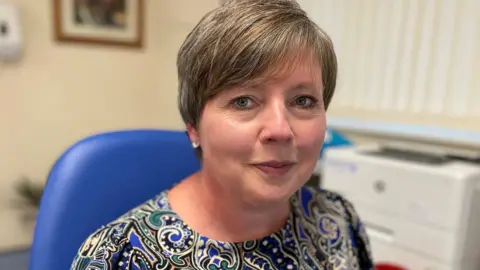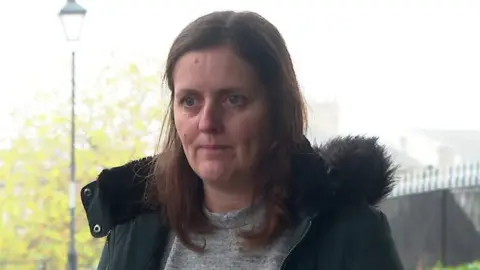Domestic abuse: GPs trained to spot signs of violence
 BBC
BBC"Women were coming back for emergency contraception or having lots of terminations. I hadn't appreciated they weren't in control of their reproductive function."
Dr Siaron West said it was only after training she realised repeat visits were not a failing of the patient.
"It was one of the things their perpetrators used to control them," she said.
She is part of a scheme training GPs to spot the symptoms of domestic abuse.
The Iris programme encourages doctors to ask if everything is OK at home and refer those in need to specialist advocate educators based at the surgery.
"I sat through the Iris training and at least half a dozen of my patients sprang into my mind," said Dr West.
"I realised that they'd be coming back to see me again, and again, and again with physical and mental health problems and we weren't getting anywhere."
Iris was introduced in Wales in 2015, with pilots funded by the South Wales Police and Crime Commissioner, covering the Cardiff and Vale health board area.
Referrals to specialist support went from an average of five per year, to 250 and the scheme has since been rolled out to other health boards, with Aneurin Bevan among the most recent.
Dr West - clinical lead for the scheme in Caerphilly - said gynaecological problems were three times more common among women experiencing abuse, but other clues included cystitis, depression and anxiety.
"The other things were mental health, drug and alcohol use - perpetrators will use those things to make their partners an unreliable witness.
"So that when they fall down and they have got bruises the GP, as well as the rest of the family, say 'well - she drinks a bit too much' or 'she's mentally unwell, she's probably making things up'.
"It's very difficult for them to be believed when they have a drug or alcohol problem and it's very easy for their perpetrators to manipulate them using those things.
"We're not completely oblivious but until my Iris training I was not aware of the extent to which I was inadvertently colluding with perpetrators. That's a horrible feeling - realising perpetrators are very clever and you've been caught up in that."

Iris is run as a social franchise, with different domestic abuse charities across different parts of Wales.
In Caerphilly and Newport, Llamau has been operating the franchise over the past six months and said referrals have gone from three to more than 70.
Nicola Fitzpatrick, head of the charity's domestic abuse services, said GPs may not have previously been confident to start the conversation with patients.
"I think that was part of the initial concern that practices may have had - they have got time-limited slots in order to see somebody. So how do they get to what might be going on in that person's home, whilst trying to diagnose the presenting condition?"
Every GP practice on the scheme gets training for all staff - including receptionists and nurses - as well as a specialist domestic abuse support worker for those who get referred.
Ms Fitzpatrick said, with the low to medium risk cases of abuse, the majority of victims had never disclosed to anyone what was going on, or spoken to the police, but see their GP's surgery as a safe space to open up.
"That's a theme that we see especially with older people who have been in relationships for 40, 50 years and think there is no other alternative - that is the only life that they've had."
She explained for many, support would mean safely staying in their relationship.
"If you have been in that relationship and it's the only one you've known for 40 years, you're asking the world of that person to suddenly leave and take a leap of faith in a completely different world."
 Getty Images
Getty ImagesThe scheme has also helped address issues such as so-called honour-based violence, forced marriage and female genital mutilation.
Iris advocate educator Meena sees a lot of this in Newport.
She has worked in this field for nearly two decades and has received threats from perpetrators - for this reason, we are not using her real name.
She said language barriers or uncertain immigration status could leave victims even more dependent on perpetrators.
"Clients who suffer with female genital mutilation suffer multiple water infections, cystitis, scarring, bleeding and they're happy to ask the GP for support.
"So we've got our victims talking. It's given them an understanding - they're thinking about what this impact may be on their children and their children's future.
"What we've identified with supporting victims from ethnic minorities, there may be multiple perpetrators. They could be cultural leaders, it could be family members, brother-in-law, sister-in-laws."
Forced marriage was another issue, she said, with women brought to the city from other countries "just so she could serve a purpose".
"There may be an agreement where the son wasn't really interested with forming a new relationship and starting a family with this woman.
There could be a family promise, lands and wealth involved, or it could be that she's going to look after the in-laws."

- BARGE BASHING AND BICKERING: Explore Welsh canals with Maureen and Gareth
- WONDERS OF THE CELTIC DEEP: Encounter mythical coasts and extraordinary creatures

